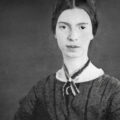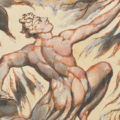Harold Bloom on Alvin Feinman’s Self-limiting Transcendence

I first met Alvin Feinman in September 1951, the day before I encountered another remarkable young man who also became a life-long friend, Angus Fletcher. Alvin was twenty-two, a year older than we were, and a graduate student in philosophy at Yale, where Angus and I were students of literature. Alvin, to my lasting sorrow, died in 2008. Of my closest friends I am fortunate still to have Angus, having lost Alvin, Archie Ammons, and John Hollander, three superb poets and majestic intellects.
I am no poet; I cannot forget. Many of my friends are or were poets: Mark Strand, a recent loss; Robert Penn Warren, and happily still with us, William Merwin, John Ashbery, Jay Wright; and younger figures: Rosanna Warren, Henri Cole, Martha Serpas, Peter Cole.
Alvin at twenty-two was already a poet of astonishing individuation: the emergence of voice in him clarified as rapidly as it had in Rimbaud and Hart Crane. I recall reading the first of his three “Relic” poems sometime in October 1951:
I will see her stand
half a step back of the edge of some high place
or at a leafless tree in some city park
or seated with her knees toward me and her face turned toward the windowAnd always the tips of the fingers of both her hands
will pull or twist at a handkerchief
like lovely dead birds at a living thing
trying to work apart something exquisitely, unreasonably joined.
A month later I was introduced by Alvin to this beautiful, intense young woman in New York. Though lovers, she and my friend seemed remote from one another. I watched her hands in constant motion tugging at a handkerchief and wondered silently at the dispassionate tone of the eight-line lyric so precisely called “Relic.”
Reciting the poem to myself these sixty years I have come to see its relationship to Eliot’s farewell to Emily Hale:
“La Figlia Che Piange”
Stand on the highest pavement of the stair—
Lean on a garden urn—
Weave, weave the sunlight in your hair—
Clasp your flowers to you with a pained surprise—
Fling them to the ground and turn
With a fugitive resentment in your eyes:
But weave, weave the sunlight in your hair.

Corrupted into Song:
The Complete Poems of Alvin Feinman
Edited by Deborah Dorfman
With a foreword by Harold Bloom and an introduction by James Geary
Hardcover, $65.00
Softcover, $19.95
Princeton University Press, 2016
The dominant influences upon Feinman’s poetry were Hart Crane, Wallace Stevens, T. S. Eliot, Paul Valéry, Rimbaud, Georg Trakl, and the earlier Rilke. I have listed them in the order of their importance in helping form his style and stance. Feinman’s prime precursor was Hart Crane, and like the poet of White Buildings and The Bridge, my friend began with a volume of difficult yet frequently radiant lyrics. Unlike Crane, Feinman was not able to go on to the larger form of a visionary romance, and his inability to continue doomed his remarkable volume to neglect.
Returning to Preambles and Other Poems floods me with memories. I had taken the little book to my editor at the Oxford University Press, the late Whitney Blake, and urged him to publish it, though not even a single poem had appeared in a magazine. Whitney discerned the high value of Alvin’s poetry and agreed to publish it if I could provide endorsements by other poets and critics. Conrad Aiken, Allen Tate, R.W.B. Lewis, John Hollander, and Geoffrey Hartman joined me in support of the new poet. Hartman made a memorable comment:
Thought thinks its ruin here without widening speculation. It finds what will not suffice…. Yet Feinman’s poetry performs so total an epoché on “discursions fated and inept” that only the stumble toward a preamble is left. For so rigorous a sensibility, writing verse must be like crossing a threshold guarded by demons….
The French critic Marcel Raymond characterized Paul Valéry’s La jeune parque and “The Marine Cemetery” as a ceaseless agon between absolute consciousness and the acceptance of natural mutability:
In them, a struggle takes place between two contrary attitudes: the pure (absolute) attitude, that of consciousness entrenching itself in its isolation, and the opposite, or impure attitude, that of the mind accepting life, change, action, giving up its dream of perfect integrity and allowing itself to be beguiled by things and captivated by their changing forms.
These two attitudes can be defined as total detachment or total involvement. In Valéry these contrary stances exist simultaneously. Feinman’s total detachment purchases its freedom at the expense of a world of mutable splendors. The astonishing clarity of his best poems makes them expensive torsos rather than comprehensive visions.
Alvin Feinman’s difficult fusion makes it a strenuous act of readership to decide where the visual and the purely visionary part in him:
“November Sunday Morning”
And the light, a wakened heyday of air
Tuned low and clear and wide,
A radiance now that would emblaze
And veil the most golden horn
Or any entering of a sudden clearing
To a standing, astonished, revealed…That the actual streets I loitered in
Lay lit like fields, or narrow channels
About to open to a burning river;
All brick and window vivid and calm
As though composed in a rigid water
No random traffic would dispel…As now through the park, and across
The chill nailed colors of the roofs,
And on near trees stripped bare,
Corrected in the scant remaining leaf
To their severe essential elegance,
Light is the all-exacting good,That dry, forever virile stream
That wipes each thing to what it is,
The whole, collage and stone, cleansed
To its proper pastoral…
__________________ I sit
And smoke, and linger out desire.And know if I closed my eyes I’d hear
Again what held me awake all night
Beside her breathing: a rain falling
It seemed into a distant stillness,
On broad low leaves beside a pond
And drop upon drop into black waters.
I cannot recall any other poem by Alvin that is this celebratory, though a cleansing light is the entire basis for rejoicing. When I first read “November Sunday Morning,” actually handed to me by the poet on a Sunday morning just before Thanksgiving, it renewed memories of my youth, when I would wander round our neighborhood early in the day and experience instant clarification of streets grown too drearily familiar. I had no name then for these bursts of transcendence, nor did they move me to composition, since any desire to write poems was alien to me. Poetry was what I read incessantly, possessed by memory, and wanted to absorb gradually. The genesis of a literary critic, at least in me, was remote from any incarnation of the poetical character.
“November Sunday Morning” is a hymn to light and reminds me that Alvin enjoyed chanting aloud Milton’s invocation to Book III of Paradise Lost. Milton and Wordsworth were his favorites among the major English poets. I remarked once to my friend that he did not center upon the sun as did Walt Whitman and Wallace Stevens but only upon the light. It was as if his sense of natural light cut itself off from the solar trajectory in defiance of Nietzsche’s Zarathustra and of all poets who emerged from Nietzsche’s shadow. What mattered about the light for Alvin was its cleansing effect upon everything open to perception. Plato would not have termed the light an all-exacting good, yet Feinman was no Platonist. Severe and rigorous, “November Sunday Morning” offers only a self-limiting transcendence. That so minimal a vision should become a poem of this extraordinary distinction continues to surprise me after so many decades of repeated recitations that I murmur to myself in the small hours of the night.
I remember Alvin’s attachment to Pilgrim Heights on Cape Cod. When first he showed me this poem, I remarked it could take a Stevensian title: “I Was Myself the Compass of That Sea”:
“Pilgrim Heights”
Something, something, the heart here
Misses, something it knows it needs
Unable to bless—the wind passes;
A swifter shadow sweeps the reeds,
The heart a colder contrast brushes.So this fool, face-forward, belly
Pressed among the rushes, plays out
His pulse to the dune’s long slant
Down from blue to bluer element,
The bold encompassing drink of airAnd namelessness, a length compound
Of want and oneness the shore’s mumbling
Distantly tells—something a wing’s
Dry pivot stresses, carved
Through barrens of stillness and glare:The naked close of light in light,
Light’s spare embrace of blade and tremor
Stealing the generous eye’s plunder
Like a breathing banished from the lung’s
Fever, lost in parenthetic air.Raiding these nude recesses, the hawk
Resumes his yielding balance, his shadow
Swims the field, the sands beyond,
The narrow edges fed out to light,
To the sea’s eternal licking monochrome.The foolish hip, the elbow bruise
Upright from the dampening mat,
The twisted grasses turn, unthatch,
Light-headed blood renews its stammer—
Apart, below, the dazed eye catchesA darkened figure abruptly measured
Where folding breakers lay their whites;
The heart from its height starts downward,
Swum in that perfect pleasure
It knows it needs, unable to bless.
Feinman’s almost solipsistic rapture partly is inherited from Stevens’s Whitmanian Hoon, who finds himself more truly and more strange by singing another Song of Myself. When he gave me the poem I initially felt wonder at what seemed Alvin’s most distinguished performance up to that time. After more than sixty years the sense of ecstasy that for him constituted the spirit of solitude has become more dialectical in my understanding. The darkened figure who breaks the poet’s reverie restores the shadow of an external world. Feinman balances the perfect pleasure that the poetic heart requires against the cost of confirmation that is a stance excluding the power of blessing otherness, whether in persons or in the hawk’s yielding balance. The poem labors to attain a generosity toward otherness and yet knowingly falls short of this accomplishment.
William Butler Yeats, another presence haunting Feinman’s poetry, trusted that casting out remorse would give him a sense of being blessed by everything and then looking upon all otherness and blessing it. Feinman, who comes later, has a vision of the mind as a ceaseless activity, engaged in suffering a process of working apart all things that are joined by it. That rending allows no hope of being blessed even by the mind’s power over a universe of death. Alvin’s major poem is “Preambles,” a hard, driving gamble with the limits of discursiveness. Its opening never abandons my memory:
Vagrant, back, my scrutinies
The candid deformations as with use
A coat or trouser of one now dead
Or as habit smacks of certitudeEven cosmographies, broad orchards
The uncountable trees Or a river
Seen along the green monotonies
Of its banks And the talkOf memorable ideals ending
In irrelevance I would cite
Wind-twisted spaces, absence
Listing to a broken wall
Though it is a poem in three parts, each segment flows without break, a quality that adds to the difficulty of discussing individual passages. Thus the montage of “Wind-twisted spaces, absence / Listing to a broken wall” leads on to further wounded tropes:
And the cornered noons
Our lives played in, such things
As thwart beginnings, limit Or
Juxtapose that longest visionA bright bird winged to its idea
To the hand stripped
By a damaged resolution
Daily of its powers ArchaiBruited through crumbling masteries
To hang like swollen apples
In the river, witnesses
Stilled to their clotted truth AllDiscursion fated and inept
So the superior reality
Of photographs The soul’s
Tragic abhorrence of detail.
I hear in the foreground of this the aura of Hart Crane’s “Repose of Rivers” and a shadow of his “Sunday Morning Apples,” a poem Alvin liked to recite to me. Yet Crane does not present us with the cognitive difficulties that are the matrix of “Preambles.” Memory in Hart Crane transmembers the poet’s sufferings into song, but in Feinman memory is always blocked. His scrutinies return to him damaged by their overreaching and yield him metaphors of deformation, twisting, absence, thwarting, limiting, stripping, and clotting. The image of working apart what has been inextricably and exquisitely joined is his central trope.
In the second preamble an adagio intervenes, as if to lower the poem’s intolerable tension, though the darkness gathers and does not fall:
So
Statues hold through every light
The grave persuasiveCandors of their stride And so
The mind in everything it joins
And suffers to redeem apart
Plays victim to its own intent
Wallace Stevens in his “Saint John and the Back-Ache” has the Back-Ache, which I take to be the fallen history of each of us, complain to Saint John:
The mind is the terriblest force in the world, father,
Because, in chief, it, only, can defend
Against itself. At its mercy, we depend
______________Upon it.
I recall remarking to Alvin in 1955, while we toured Devon and Cornwall together, that Stevens had a premonition of the impasse “Preambles” was to constitute for the later poet. The final section of Feinman’s major poem renders that impasse with an agile but self-undoing eloquence:
These even love’s rejoinder
As of every severed thingThe ecce only, only hands
Or hardnesses, the gleam a water
Or a light, a paused thing
Clothes in vacua killedTo a limbless beauty Take
These torn possessives there
Where you plead the radiant
Of your truth’s gloom OwnTo your sleep, your waking
The tread that is walked
From the inner of its pace
The play of a leaf to an earth.
The image of severing always negates the gleams and radiances that Feinman ultimately inherited from Wordsworth and from Stevens. For Wordsworth the light of common day at last subsumed the glory and the freshness of his poetic dream. Stevens, who cried out jubilantly: “What is there here but weather, what spirit / Have I except it comes from the sun?,” sustained his poetry in Whitman’s mode of opening the self to the wind and the weather and, above all, the sun. I sorrowed even in the middle 1950s that Alvin was destroying his extraordinary gift by an asceticism alien to poetic vision.
I do not find in any of the new poems in this volume anything equal to the best work in the book I helped to foster, Preambles and Other Poems (1964). The only one that moves me greatly is “Matinal,” initially titled “Morning-Hymn for the Breaker of Horses.” I have no idea when Alvin composed this, and at first reading it seemed a kind of self-parody. Gradually I have come to admire it, but with some reservations, since its high style is rather hyperbolical. Feinman must have been aware that W. B. Yeats is too strong a presence in “Matinal.”
Where wild god-bridled terrors joy
My thundered pulse; not I,
Some lashed stone presence wakes
To wield, to quicken, buoy
This thrill galvanic gusto sky-
Ward where sun-slashed heavens break,To chant the reins of spirit skilled
To bone, as is thy sling
Of brilliance turmoil bound,
Thy mounted salvos drilled
Past dare of conjuring
The paean of tempest deafness drowned:
Alvin was always happiest on or near rocky beaches, whether on Cape Cod or in Cornwall. He particularly liked to watch dawn come up, and exulted in the impact of wave on rock. His ascetic spirit was assuaged by the blast and vaulting of the wind’s voice echoing cliffs and scattering the light of a new day. Seven years after his final vanishing, I continue to mourn both my friend and the gift he failed to nurture. I write this in the elegy season of early November 2015, and end this celebratory foreword with the final quatrain of “Matinal”:
Wave shattering wave, past sense,
Past power commute the breath,
O epic tempo of no birth or death
Blastbind the blood thy reverence.
“Matinal”
White maned morning vaults the spume,
The trumpet drum of wave on rock;
Blasting the jeweled light apart
Each gothic aerial shock
Rides warrior wind like a helmet plume
As chariot riot drinks the heart,
The weathered eye and flesh of me
Out-voiced, out-fabled, rung:
Some brine archaic Mastery roars
Clarion laughter flung
Tideward astride the glistening knee
Of cliffed and echoing shores
Where wild god-bridled terrors joy
My thundered pulse; not I,
Some lashed stone presence wakes
To wield, to quicken, buoy
This thrill galvanic gusto sky-
Ward where sun-slashed heavens break,
To chant the reins of spirit skilled
To bone, as is thy sling
Of brilliance turmoil bound,
Thy mounted salvos drilled
Past dare of conjuring
The paean of tempest deafness drowned:
Wave shattering wave past sense,
Past power commute the breath,
O epic tempo of no birth or death
Blastbind the blood thy reverence.
“Matinal” excerpted from Corrupted into Song: The Complete Poems of Alvin Feinman by Alvin Feinman. © 2016 Princeton University Press. Reprinted by permission.
Essay © 2016 Harold Bloom. First published as the foreword to Corrupted into Song: The Complete Poems of Alvin Feinman by Alvin Feinman.
Photo: Alvin Feinman, 1950s; © Deborah Dorfman





